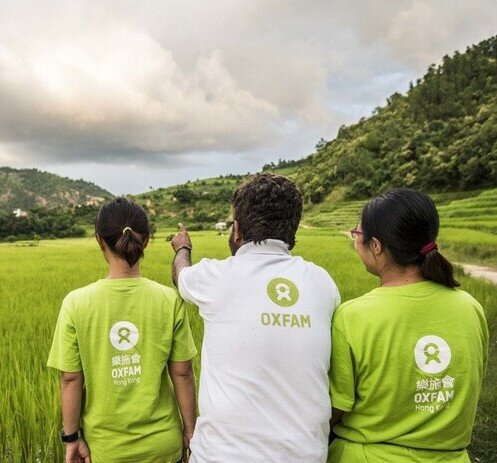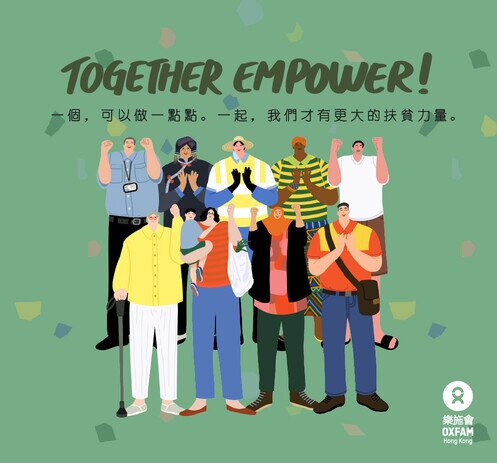How socially responsible a company is directly impacts the welfare of its frontline staff and supply chains. (Photo: Eleanor Farmer / Oxfam)
The importance of CSR
Oxfam believes companies have an important role to play in society, and can be a major force for good by alleviating poverty and ensuring sustainable development in communities. If businesses upheld the rights of the poorest in their supply chains, for instance, paid their employees reasonable wages and provided safe working environments for their employees, this would directly protect their most vulnerable workers. Further, by paying their fair share of taxes, businesses would enable governments to better fund public services and poverty alleviation efforts, thus giving the poorest a chance to escape poverty.
Oxfam's advocacy effort
To this end, Oxfam has been a strong advocate of corporate social responsibility (CSR) and businesses paying their workers reasonable wages; we have also been strongly urging companies to improve their tax transparency and pay their taxes in full. CSR not only benefits society as a whole, but also helps companies develop a good image, promote their business growth and achieve a win-win situation.
Oxfam has long been encouraging CSR. In 2004, we released the research report ‘Turning the Garment Industry Inside Out – Purchasing Practices and Workers’ Lives’, and in 2006 and 2009, we published ‘Transparency Reports’ I and II, again on the garment sector, focusing on Hong Kong and mainland Chinese companies. In both 2008 and 2009, Oxfam published two pieces of research on the CSR performance of Hang Seng Index (HSI) constituent companies, and in 2016, we published our research on companies’ Environmental, Social and Governance (ESG) reporting to urge businesses to improve their policies and take the lead in CSR. In order to improve the standards of corporate reporting, we published a report about listed food companies’ CSR performance. In 2018, we also released the results of our study on how much the top 100 listed companies in China, Hong Kong and Taiwan supported the United Nations’ Sustainable Development Goals in their business practices.
Since 2010, our advocacy work has extended to regulatory bodies. We have submitted two submissions concerning the revision of the Companies Ordinance and ESG reporting to Financial Services and Treasury Bureau and the Hong Kong Stock Exchange respectively. In 2015, we began to engage with institutional investors by conducting a survey to collect their views on ESG reporting requirements for listed companies. In 2016, we began expanding our initiatives to include tax transparency and submitted our position paper on how to counter base erosion and profit shifting, and enhance transparency to the Financial Services and Treasury Bureau. In 2018 Dec, Oxfam announced its 'Hong Kong Living Wage Report', which put forth the first local living wage rate: HK$54.7/hour. The agency is now calling on the government and employers who are able to pay their employers a living wage, as the current minimum wage has not been able to keep up with inflation and does not take the basic needs of employees’ families into account.
In 2023, Oxfam announced its ‘2022 Hong Kong Living Wage Study’, and proposes that employers pay their employees no less than HK$60.1/hour. OHK reviews the Living Wage standard annually, using the CPI(A), and announces any revisions in the first quarter of the year. Living Wage Employers will then have a six-month period to adjust the salaries of their direct employees.
Oxfam recognises employers who pay a living wage and will award the 'Living Wage Employer Logo' to acknowledge their responsible wage policy. This logo can be used on eligible applicants' social media, websites, or other promotional materials. Employers can apply for the 'Living Wage Employer Logo' on this page. If you have any questions, please contact us by email at [email protected] or call us on 3120 5292.
Environmental, Social and Governance , ESG Reporting
Oxfam is urging companies to report on labour, environmental, human rights, equal opportunities and other areas of their business, and through these areas, implement strategies and policies that help alleviate poverty. This will enable all companies to enhance transparency and the public to monitor their ESG and CSR performance. As such, we have undertaken studies in this are a and have repeatedly urged the Hong Kong Stock Exchange to raise its ESG reporting requirements for listed companies in Hong Kong.
*Only available in Chinese
CSR Performance of Blue Chip Companies
At the end of 2008, we published our first CSR report, which was also the first attempt in Asia to document the CSR policies of the largest companies in the Hong Kong stock market. In 2016, we launched another study in this area based on the improved ESG reporting standards. In it, we assessed the performance of HSI companies and looked at how these companies can respond to important social and environmental issues through their business strategies.
We are calling Hong Kong’s large companies to fight poverty, follow international best practices and take the lead in CSR.
*Only available in Chinese
CSR Performance of Top 50 Blue Chip Companies in 2016
Nearly a third of the companies lagged behind in Environmental, Social and Governance (ESG) and fell in the ‘unstable’ category.
Fighting for greater tax transparency
Taxation is an important way for the government to fight poverty, however, many multinational corporations often enjoy or make use of low tax rates, tax concessions and tax loopholes. This makes it difficult for governments to fund public services to alleviate poverty, and this oftentimes affects people who live in developing countries most.
The OECD’s measures to counter base erosion and profit shifting (BEPS), as well as the Financial Action Task Force’s guidance on beneficial ownership are both aimed at enhancing tax transparency and preventing companies from tax dodging. In response to the government’s consultations in these areas, we submitted two papers:
*Only available in Chinese




